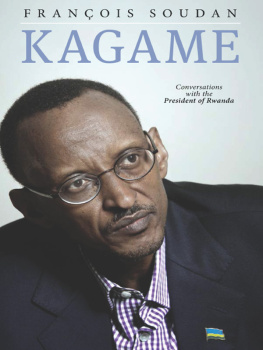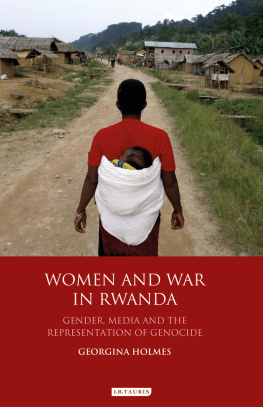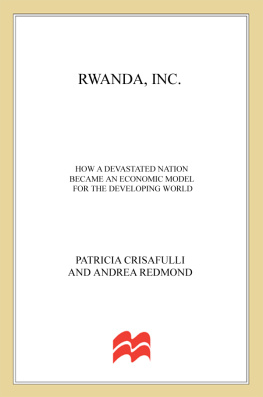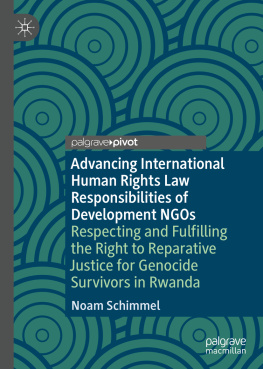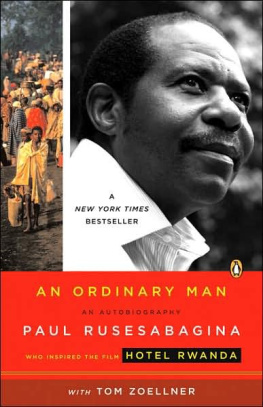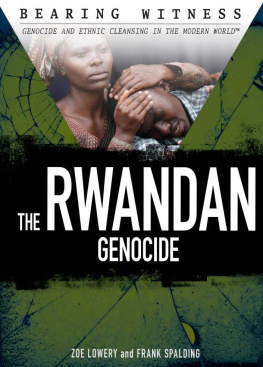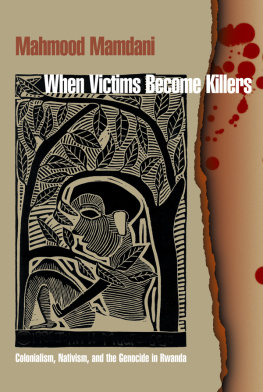Franois Soudan
KAGAME
Conversations with the
President of Rwanda
Enigma Books and Nouveau Monde ditions
All rights reserved under the International
and Pan-American Copyright Conventions.
Published in the United States by
Enigma Books
www.enigmabooks.com
No part of this publication may be reproduced, stored in a retrieval
system, or transmitted, in any form or by any means, electronic,
mechanical, photocopying recording, or otherwise without the written
permission of Enigma Books.
Copyright 2015 by Nouveau Monde ditions and IDM La Revue
ISBN: 978-1-936274-80-2
e-ISBN: 978-1-936274-99-4
A Co-Edition by Enigma Books and Nouveau Monde ditions
Printed in the United States of America
Library of Congress Cataloging-in-Publication Data
[Available on Request]
Preface
F or those who are as result-drivenand obsessed with controlling resultsas he is, Rwanda, along with post-war Germany and Japan, is one of the most impressive and successful examples of post-conflict reconstruction in history. With one significant difference, however, for the extreme circumstances under which Paul Kagame came to power were not that of a military defeat, but of a victory over the instigators of a horrendous genocide that was carried out by none other than a portion of the Rwandan people themselves.
Twenty years later, the figures attesting to the extent of this African success story are staggering: Life expectancy has risen from 45 to 65 years; infant mortality rate has dropped by 70%; per capita income has increased 60%; over a million Rwandans have been lifted out of extreme poverty; more than 90% of children under 12 go to school; yearly economic growth hovers around 7%; and Rwanda ranks 2nd among African nations in the 2014 Doing Business report, which measures the quality of a countrys environment in reference to conducting business, the ease of doing business, and results obtained in the fight against corruption.
More surprisingly, Rwanda has become the leading country in the world in terms of women's representation in Parliament. In fact, 64% of elected officials are women; half the judges serving on the Supreme Court as well as 9 out of 21 ministers are women. This extraordinary result is both the fruit of necessity (in the aftermath of the genocide which exterminated a tenth of the population, 70% of Rwanda's adult population was female), as well as laws and quotas imposed by Paul Kagames political will, but also, and increasingly so, due to a veritable cultural upheaval among all the inhabitants of the Land of a Thousand Hills.
During the course of numerous interviews with Paul Kagame for the weekly magazine Jeune Afrique , and for this book, I was unfailingly struck by the austere, Spartan, and analytical side of his personality, but also by the impression he gives of never having abandoned the combat he took on thirty-five years ago when, as a young refugee, he joined the ranks of Ugandan rebels in Tanzania serving alongside the future (and present) President Yoweri Museveni. Kagame is a man driven by a permanent sense of urgency and vigilance. He sleeps but five hours a night, works fifteen hours per day, devours economic treatises, never drinks alcohol and hates losing a tennis matchone of his few leisure activities. An indomitably resilient dynamo and the driving force of Rwanda, this president, born from Batutsi aristocracy and seemingly made of tempered steel, knows that Never again (the genocide and its million deaths) requires economic development and the construction of a post-ethnic society that has managed to prevail over its bloodshedding identities.
Admittedly, twenty years later all the wounds havent yet healed. It takes at least one or two generations to go from intercommunity coexistence to reconciliation, even more so since, as the writer Boubacar Boris Diop so rightly described, the paradoxical nature of the memory of genocide is that the more time passes, the less one forgets. Hence the vigilance, which according to Kagame, shall not be synonymous with vengeance. He who already decided several years ago to no longer visit the sites of the 1994 massacres in order to avoid having his judgment and acts influenced by the slightest emotionis directly at the origin of the Gacaca courts. A unique and unanimously praised experience of participative justice, which has allowed for the handling, with the greatest of equity, of more than a million cases of alleged guilt in the popular genocide; a process which allowed Rwanda to avoid lapsing into the unstoppable cycle of ethnic retaliations.
Before the colonial period, Rwanda was a strong, centralized monarchy. Today it is a solid and strictly controlled Republic. For if Rwanda shows impressive results, the methods used to obtain them are unquestionably directive. President Kagames watchful eye surveys each and every acre of this calm, clean, and ordered African country, where it is unimaginable to find a motorcyclist without a helmet, a pedestrian without shoes, a thatchedroof hut, or a plastic bag littering the streets; and where it is seen as poor manners to be smoking in public or sharing banana beer from the same jugan age-old tradition declared officially unhygienic, and thus prohibited.
To those who criticize his well-controlled conception of the democratic process and human rights, Paul Kagame replies with artful sophistry, which he willingly cultivates: Only a free people can accomplish so much. He adds: It is not Rwanda that has a problem with the outside worldits the Western world that is having difficulties accepting the emergence of a new, self-confident Africa, certain of its rights and uncompromising when it comes to respecting its sovereignty, of which Rwanda is the symbol, reference, and model for many Africans.
In 2017, the year of the next presidential election for which he should be a candidate (although he considers the question premature, and therefore without import), the Kagame generation born after the genocide will constitute the majority of voting-age Rwandans. To this youth, who do not feel accountable for the faults that may have been committed by their parents, but who nonetheless are well aware of the crimes of some and the sacrifices of others, Paul Kagame proposes another battle: that of building a pluralistic and democratic society, where one can live their differences in mutual respect.
After war and barbarity there was renaissance; now the time for Rwandan maturity has finally come.
Franois Soudan
Conversations
with the
President of Rwanda
Are you aware of being different from other heads of state?
I do not know how other heads of state feel about holding this position, but in my case, being a head of state is a great responsibility that weighs very heavily upon me. In many respects, it represents a struggle, in the sense that I wish to fulfill my duties to the best of my ability, but I would also like to be who I am. Finding the right balance is always a struggle; one must make sure not to cross the line, so that ones private life doesn't interfere with being the president or with the positions inherent responsibilities. As a statesman, one is constantly sorting out these two aspects, but I must say I take pride in what I have accomplished in that respect.
It seems as though you perceive life as being a constant battle?
Its not the way I perceive it; it just seems to be the way it isand I see it for what it is. Indeed, I have learned from and been shaped by my life experience. The entire journey has been more or less a fight: anything you want you have to fight for. You can't take anything for granted, I certainly have not. My experience has always been that you have to stand up and fight for what you want.
Next page
